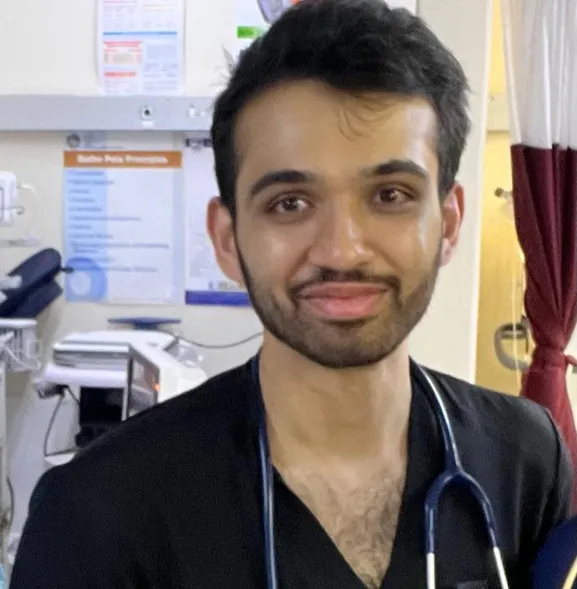Medicine: a journey worth the challenge
JUNIOR medical doctors in South Africa will be tested from the moment of their inception as they learn to survive, says Dr Ishq Pramchand

Junior medical doctors in South Africa will be tested from the moment of their inception as they learn to survive, says Dr Ishq Pramchand
Image: File
Medicine is a science of uncertainty and an art of probability,"- Sir WilliamOsler, the Father of Modern Medicine
JUNIOR medical doctors in South Africa will be tested from the moment of their inception as they learn to survive. The public healthcare system in South Africa is a high-pressure environment, fraught with many challenges, which initially may seem daunting to the 1st year intern.
Such challenges, I feel, are integral to personal growth and significantly contribute to resilience in the field, which will carry you throughout your medical career and beyond.
I have had the privilege of gaining invaluable exposure to our healthcare system at grass-roots level. Having graduated Summa Cum Laude and Top Achiever of the Class of 2021 at the Nelson R Mandela School of Medicine, I pursued a rigorous 2 year Internship programme at King Edward VIII Hospital in Durban. I, thereafter, completed 1 more year as a community service medical doctor at Charlotte Maxeke Hospital in Johannesburg.
Now, I find myself "catching my breath" as I locum privately in Durban and await a registrar position in my specialty of choice.
Medicine is not easy. The pathway may seem simple but is a complex, transformative process geared towards shaping a competent, safe medical doctor. Seemingly endless hours of studying, tough examinations and a dwindling social life set a strong foundation for the future: draining night shifts, life or death situations, and the optimism to keep going and never give up.
The reality does not make it any easier.
Nationally, South Africa faces a critical shortage of doctors, with less than one doctor for every 1 000 patients. This precarious imbalance places strain on the frontline doctors in the public health sector, exacerbated by the limited access to medical resources. While South African medical doctors are trained excellently in local institutions, which match international standards, poor patient outcomes are often the result of suboptimal care.
Frustration, physician burnout and unfavourable team dynamics are a handful of common challenges faced by the young doctor with the potential to strongly influence patient outcomes, with catastrophic consequences if not recognised and addressed timeously. Even "breaking bad news" to patients and their families regarding a life changing diagnosis like cancer, or the death of a loved one, may also intimidate the junior medical intern, with grievous implications if managed inappropriately.
How do we survive in the system? Is there a way?
Resilience, in the context of a medical doctor, translates to your "toughness": your capacity to withstand and recover from difficult situations. This may be a particularly helpful attribute as a budding medical intern, who faces the daily, relentless onslaught on mind, body and soul with no appreciable time to recover.
Interestingly, the field of medicine mirrors the battlefield, reflecting the crucial principles a young soldier in the heart of combat should follow to survive. Protection of the sick, damage control, and witnessing death at the frontline are overlapping features, which scratch the surface. Deeper psychological defences are at play: hope, love for the craft, and "true grit" which constitute honour for modern day martyrs and the safety of the patients they defend.
Fortifying your resilience is a personal process, a culmination of years of experience. Everyone is not the same. However, the global literature emphasises the need for holistic well-being in demanding environments to deliver optimal results. A modern shift in social structures towards understanding mental health and overall happiness emphasise the need for the individual to develop himself not only physically, but psychologically and socially.
This relates aptly to the medical practitioner where a "Biological-Psychological Social" approach to the patient translates to excellent, holistic patient outcomes, often curbing prevalent mental health conditions such as depression. Conversely, the same principles can be applied to the medical practitioner to not only improve daily practice, but to inspire passion in the art.
Time is limited. As a junior medical officer, I understand that more, having navigated an exhausting yet exhilarating internship and community service. I also understand that effective time management is key to enjoying these tough incipient years.
Starting small, and tackling life as a medical doctor in "bite-size" chunks, may help you find the balance you are looking for. Personally, I love reading. I try to reserve at least 10 to 15 minutes a day every day to consult the literature and read more to improve my practical medical knowledge. I’m also passionate about Kung Fu and music.
I try to put some practice early in the morning before I get to work, getting a "kick" out of Kung Fu practice and finding my rhythm at the piano. When on call, I try to match the daily exercise quota by taking the stairs instead of the lift to get some extra steps in. Something is always better than nothing.
Dedicating time and focus to these activities I enjoy have made me understand my life as a medical doctor better. Significantly, published literature highlights a plausible connection between a sound understanding of the arts and a higher degree of empathy towards patients, improving long term patient outcomes. The existing challenges seem easier, and I feel energised to tackle newer, more complex ones.
Ultimately, medicine is not for the faint hearted and may be demanding at times. You will always be faced with challenges in the field, which may present themselves unexpectedly, often with no help available at the time. It is important to trust in your ability to learn from life’s experiences holistically, manage every challenge with the patient’s best interests at heart, and enjoy your journey as a medical doctor.
How to survive as a junior doctor
- Read a little everyday
- Start small
- Eat and drink well: healthy meals, snacks and drinks
- Comfortable footwear
- Take the stairs
- Speak about your experiences
- Sleep well
- Hobbies
- Laugh and smile often
- Your teachers are everyone and everywhere
- Dedicated time-out
- There is always a good side to everything

Dr Ishq Pramchand
Image: Supplied
Dr Ishq Pramchand, 27, of Durban, graduated at the Nelson R Mandela School of Medicine at UKZN with Summa Cum Laude and as the Top Achiever of the Class of 2021. Email [email protected]
** The views expressed do not necessarily reflect the views of IOL or Independent Media.
Related Topics: